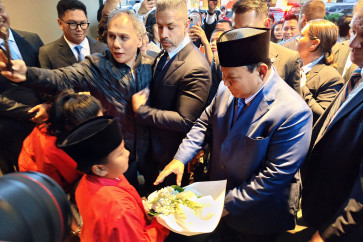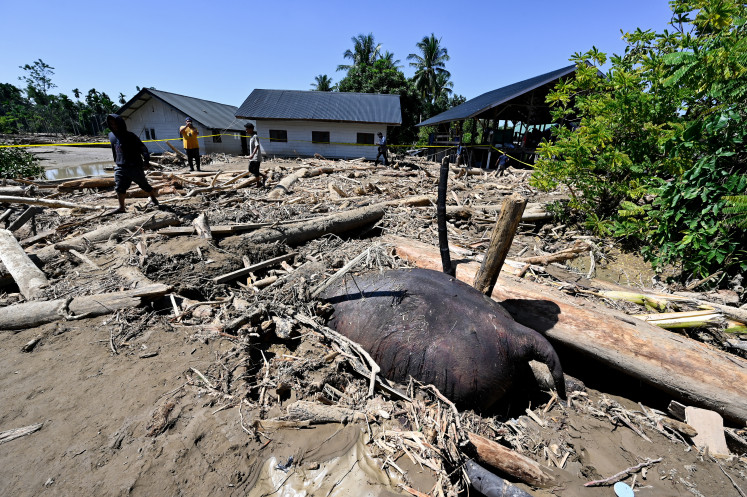Popular Reads
Top Results
Can't find what you're looking for?
View all search resultsPopular Reads
Top Results
Can't find what you're looking for?
View all search resultsThe smoking dilemma
No smoking please: Parents and students walk past a sign banning smoking, placed in front of a kindergarten in Pontianak, West Kalimantan
Change text size
Gift Premium Articles
to Anyone
 No smoking please: Parents and students walk past a sign banning smoking, placed in front of a kindergarten in Pontianak, West Kalimantan.(JP/Severianus Endi)" border="0" height="341" width="512">No smoking please: Parents and students walk past a sign banning smoking, placed in front of a kindergarten in Pontianak, West Kalimantan.(JP/Severianus Endi)
No smoking please: Parents and students walk past a sign banning smoking, placed in front of a kindergarten in Pontianak, West Kalimantan.(JP/Severianus Endi)" border="0" height="341" width="512">No smoking please: Parents and students walk past a sign banning smoking, placed in front of a kindergarten in Pontianak, West Kalimantan.(JP/Severianus Endi)In a country where about one-third of the people smoke, Indonesia finds it hard to take a firm stance against cigarettes â a product loaded with toxins that pose serious health risks.
In his final months, aspiring singer Robby Indra Wahyuda, who lost his ability to speak because of throat cancer, sarcastically urged his Facebook friends: âCome on, Bro, smoke a lot and accompany me here so we can create a mute community together.â
At the age of 26 in 2014, Robby â a heavy smoker in Samarinda, East Kalimantan â was diagnosed with stage-three laryngeal cancer.
After the first surgery on his left vocal cord, he could only speak in a hoarse whisper. He completely lost his voice after the surgery on his other vocal cord.
He breathed through a hole in his throat and ate with a tube connected to his nose. At one time, he regretted his inability to smell the aroma of food.
The disease took away his voice and his musical aspirations, but it also inspired him to wage a campaign against the perils of smoking on his Facebook page â where he posted photos of himself smiling while being treated at the hospital, or satirically joked about his deteriorating health.
He also initiated a petition on change.org, calling on President Joko âJokowiâ Widodo to accede to the World Health Organization Framework Convention on Tobacco Control (WHO FCTC) in the hope of reducing the alarming prevalence of smoking in the country, in particular among juveniles. His petition has collected more than 30,000 signatures.
The treatyâs provisions include rules that govern the production, sale, distribution and taxation of tobacco, including a comprehensive ban on tobacco advertising.
However, by the time the cancer claimed his life on June 23 last year â and even until today â Robbyâs hope had not yet materialized. Indonesia remains the sole ASEAN country not to have ratified the treaty.
Indonesia is among the top five countries in the world with the most smokers. As many as 61.4 million Indonesians, representing 36.1 percent of its population, use tobacco by smoking and/or in smokeless forms, according to the 2011 Global Adult Tobacco Survey.
Two-thirds, 67.4 percent, of men over 15 years old smoke, making Indonesia the country with the worldâs highest smoking prevalence among males.
Cigarette products can be advertised in mass media and on billboards with several limitations as stipulated by national and local regulations.
âIt is silly that you canât advertise infant formula and medicine in the country, but you can advertise cigarettes, a product that claims peopleâs lives,â said Kartono Muhammad, an advisory board member with the National Commission on Tobacco Control (Komnas PT).
Smoking-related diseases claimed the lives of 190,260 Indonesians in 2010, representing 12.7 percent of deaths that year, according to a 2012 study by Health Ministry researcher Soewarta Kosen. Meanwhile, Tobacco Atlas 2015 states that every year 217,400 people in the country die because of such diseases.
Buying cigarettes is generally convenient and cheap. In the middle of a traffic jam in Jakarta, drivers can buy loose cigarettes from itinerant snack sellers for less than Rp 1,000 (8 US cents) each without having to see the disturbing pictoral warnings on the packs.
span class="caption">No smoking please: Parents and students walk past a sign banning smoking, placed in front of a kindergarten in Pontianak, West Kalimantan.(JP/Severianus Endi) In a country where about one-third of the people smoke, Indonesia finds it hard to take a firm stance against cigarettes ' a product loaded with toxins that pose serious health risks. In his final months, aspiring singer Robby Indra Wahyuda, who lost his ability to speak because of throat cancer, sarcastically urged his Facebook friends: 'Come on, Bro, smoke a lot and accompany me here so we can create a mute community together.' Fallen victim: The late Robby Indra Wahyuda uploaded a photo of himself surrounded by doctors to his Facebook page as part of efforts to wage an antismoking campaign. He died from laryngeal cancer.(Courtesy of Robby Indra Wahyuda) To receive comprehensive and earlier
access to The Jakarta Post print edition, please subscribe to our epaper
through iOS' iTunes, Android's Google Play, Blackberry World or Microsoft's
Windows Store. Subscription includes free daily editions of The Nation, The
Star Malaysia, the Philippine Daily Inquirer and Asia News.
For print subscription, please contact
our call center at (+6221) 5360014 or subscription@thejakartapost.com
N
At the age of 26 in 2014, Robby ' a heavy smoker in Samarinda, East Kalimantan ' was diagnosed with stage-three laryngeal cancer.
After the first surgery on his left vocal cord, he could only speak in a hoarse whisper. He completely lost his voice after the surgery on his other vocal cord.
He breathed through a hole in his throat and ate with a tube connected to his nose. At one time, he regretted his inability to smell the aroma of food.
The disease took away his voice and his musical aspirations, but it also inspired him to wage a campaign against the perils of smoking on his Facebook page ' where he posted photos of himself smiling while being treated at the hospital, or satirically joked about his deteriorating health.
He also initiated a petition on change.org, calling on President Joko 'Jokowi' Widodo to accede to the World Health Organization Framework Convention on Tobacco Control (WHO FCTC) in the hope of reducing the alarming prevalence of smoking in the country, in particular among juveniles. His petition has collected more than 30,000 signatures.
The treaty's provisions include rules that govern the production, sale, distribution and taxation of tobacco, including a comprehensive ban on tobacco advertising.
However, by the time the cancer claimed his life on June 23 last year ' and even until today ' Robby's hope had not yet materialized. Indonesia remains the sole ASEAN country not to have ratified the treaty.
Indonesia is among the top five countries in the world with the most smokers. As many as 61.4 million Indonesians, representing 36.1 percent of its population, use tobacco by smoking and/or in smokeless forms, according to the 2011 Global Adult Tobacco Survey.
Two-thirds, 67.4 percent, of men over 15 years old smoke, making Indonesia the country with the world's highest smoking prevalence among males.
Cigarette products can be advertised in mass media and on billboards with several limitations as stipulated by national and local regulations.
'It is silly that you can't advertise infant formula and medicine in the country, but you can advertise cigarettes, a product that claims people's lives,' said Kartono Muhammad, an advisory board member with the National Commission on Tobacco Control (Komnas PT).
Smoking-related diseases claimed the lives of 190,260 Indonesians in 2010, representing 12.7 percent of deaths that year, according to a 2012 study by Health Ministry researcher Soewarta Kosen. Meanwhile, Tobacco Atlas 2015 states that every year 217,400 people in the country die because of such diseases.
Buying cigarettes is generally convenient and cheap. In the middle of a traffic jam in Jakarta, drivers can buy loose cigarettes from itinerant snack sellers for less than Rp 1,000 (8 US cents) each without having to see the disturbing pictoral warnings on the packs.
Even those who buy cigarette packs may not have a clear look at the mandatory pictoral warnings, which went into effect in 2014. Research by the Indonesian Consumers Foundation (YLKI) in 2014 found that 66 percent of the surveyed cigarette packs in four major cities have their pictoral warnings covered by excise tapes.
Komnas PT, YLKI and some tobacco control activists suggest the government and the House of Representatives have done little to curb the alarming prevalence of tobacco use in the country.
They particularly directed their concern at the deliberation over the tobacco affairs bill.
While several national and local regulations categorize tobacco and cigarettes as products containing addictive substances that pose health risks, the bill carries a completely different spirit ' it recognizes tobacco as 'one of Indonesia's natural resources that holds a strategic role that should be managed prudently for the welfare of all citizens'.
The fight against tobacco use took an odd turn last year when the House intended to include kretek clove cigarettes as a national heritage in a draft culture bill. If the provision was included and passed into law, the government would have been obliged to document, promote and protect traditional kretek, as well as facilitate its development.
The controversial articles acknowledging kretek as a cultural heritage had reportedly been dropped from the draft bill after they triggered a heated debate.
'Why is something hazardous and addictive included in the culture bill? What kind of culture do the lawmakers mean by that?' asked Komnas PT chairman Prijo Sidipratomo.
Even Vice President Jusuf Kalla and Culture and Education Minister Anies Baswedan voiced their disagreement.
'Not all cultural heritage deserves to be developed. If it's bad, we should change that,' Anies told tempo.co. 'Upeti [extortion in the form of taxes] and carok [dueling with scythes] are indeed culture from the past, but do they deserve to be preserved?'
Jibal Windiaz, coordinator of a kretek community chapter in Jakarta, was also puzzled by the sudden insertion of kretek into the bill, although he agrees kretek must be preserved. 'It seems kretek is being criminalized. We should remember that this is a legal product. Eradicating kretek means we will lose our national character,' he said.
The deputy chairman of the House legislation body, Firman Soebagyo, was the first to suggest the inclusion of the kretek provision under the consideration that kretek is 'a culture that cannot be found in other countries'. Soon, several other lawmakers had thrown in their support, noting the significant economic contributions of the cigarette industry.
The government received Rp 116 trillion from cigarette excise taxes in 2014. The country produced 344 billion cigarettes in 2014 and aims to double the production to 524.2 billion cigarettes by 2020, according to the Industry Ministry's tobacco industry roadmap issued in 2015.
The cigarette industry employs some 6.1 million people, said Industry Minister Saleh Husin. The Association of Indonesian Tobacco Farmers (APTI) said that in 2013, some 2.1 million tobacco farmers' livelihoods depended on the industry, although anti-tobacco campaigners argue the number was far less.
Hasan Aoni Aziz of the Indonesian Cigarette Producers Association (Gappri) pointed to the decrease in the number of cigarette factories in the last five years, from 3,255 to 600, that was due to stricter tobacco controls and rising excise rates.
By acceding to the WHO FCTC, he said he was concerned Indonesia would be tied to every decision made by the WHO FCTC's Conference of the Parties (COP), held every two years. 'This means we give it all up to foreign countries, which may make new decisions in every COP,' Hasan said.
For Robby's father, Elansyah Jamhari, his eldest son's departure did not put a stop to his fight against tobacco use.
'Losing a son is a deep grief,' Elansyah said. 'I don't want other families to feel the same.'
_______________________________
Your Opinion Matters
Share your experiences, suggestions, and any issues you've encountered on The Jakarta Post. We're here to listen.
Thank You
Thank you for sharing your thoughts. We appreciate your feedback.
Share options
Quickly share this news with your network—keep everyone informed with just a single click!
Gift Premium Articles
to Anyone
Share the best of The Jakarta Post with friends, family, or colleagues. As a subscriber, you can gift 3 to 5 articles each month that anyone can read—no subscription needed!
Continue in the app
Get the best experience—faster access, exclusive features, and a seamless way to stay updated.









